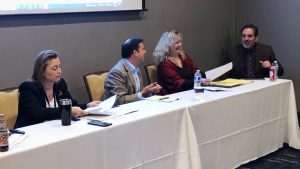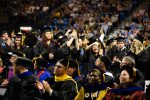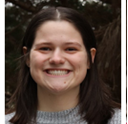PSIA Faculty at GPSA 2022
This past fall, multiple PSIA faculty members attended and participated in the Georgia Political Science Association’s (GPSA) 53rd annual conference located in Savannah, Georgia. Faculty attendees included: Dr. Armstrong-Williams, Dr. Cavalli, Dr. Ealey, Dr. Gershtenson, Dr. Greathouse, Dr. Kellogg, Dr. Kelly, Dr. Miner, Dr. Montagano, Dr. Price, Dr. Rohrer, Dr. Rossier, Dr. Viman-Miller.
Founded in 1968, GPSA is the professional association of political science practitioners and educators in Georgia. Members come from the public, private, and academic sectors. The ‘22 conference theme was “The Scope of Conflict”.
Our faculty members participated in the conference in various ways. Some were presenters, such as Dr. Armstrong Williams, Dr. Greathouse, Dr. Miner, Dr. Price, and Dr. Viman-Miller, who were all on a panel together and discussed topics related to the Ukrainian War and ensuing issues of politics, security, and war crimes.
 (L-R) Drs. Viman-Miller, Price, Armstrong-Williams and Miner
(L-R) Drs. Viman-Miller, Price, Armstrong-Williams and Miner
Our other PSIA faculty presenters were Dr. Ealey, Dr. Kelly, Dr. Montagano, Dr. Rohrer, Dr. Gershtenson, and Dr. Rossier, who all presented on multiple topics and within multiple panels. Most of our faculty also participated as panel chairs/discussants, where they helped lead the discussion within the panels, provided feedback to the presenters, and assisted with the overall running of their respective panels.
When asked about her favorite part of the conference, Dr. Kelly said, “[t]his year, my favorite part of the GPSA conference was getting to see the scholarship of undergraduate students from the University of North Georgia and elsewhere. I am always impressed by the amount of effort and level of research of these students. My hope is that more UNG students participate in this conference in the future.”
For Dr. Cavalli, his favorite part was “on the academic side, learning about the research that is taking place, especially in my areas of interest (American elections and institutions – presidency, congress, political parties); and on the social side, the comradery of re-engaging with friends and colleagues from all over the state.”
[author: Orla Fennell, IA ’23]


